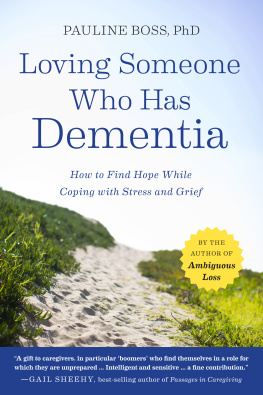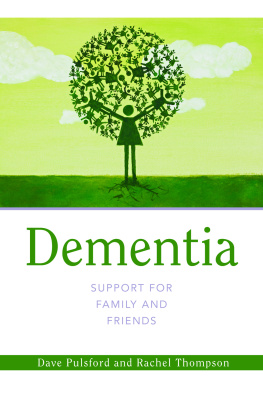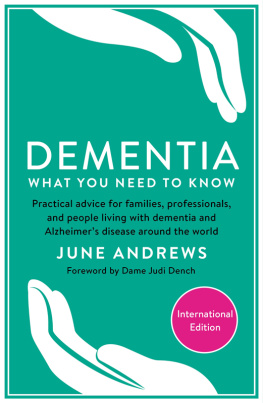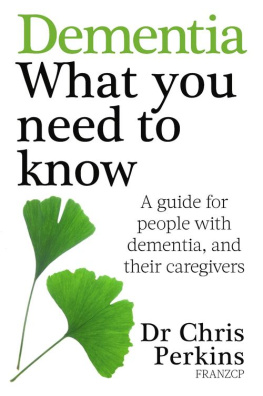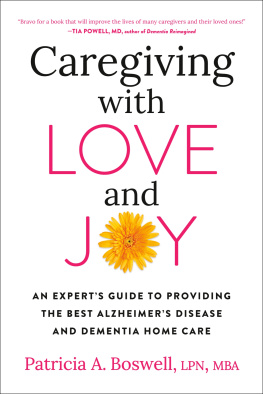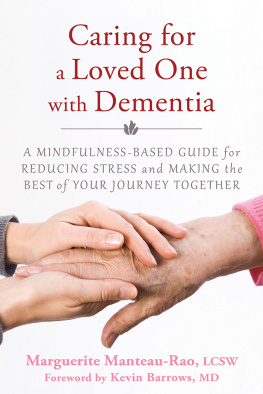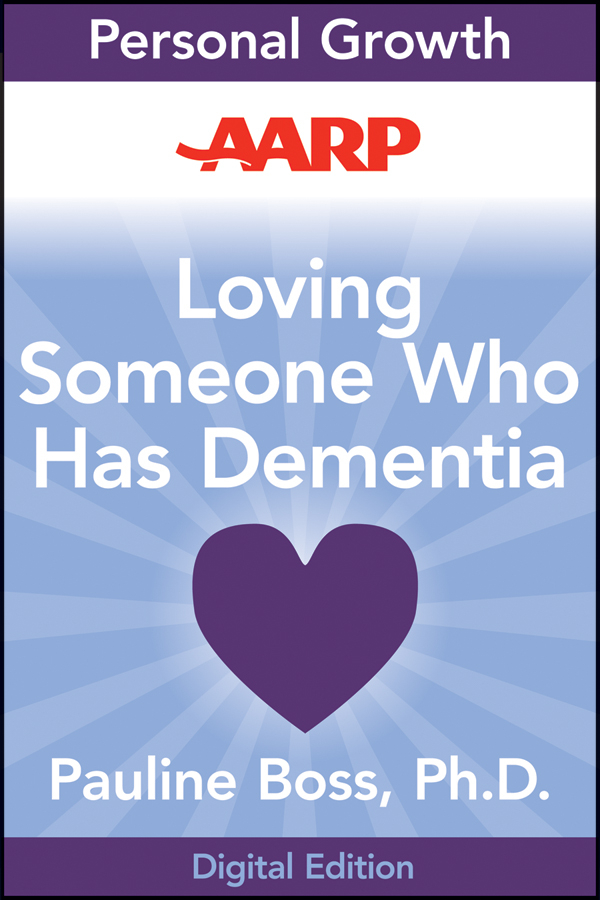FEEL BETTER EVERY DAY
Maybe you're ready to master the challenges and fears that have held you back. Or maybe you want to delve deeper into your relationships. Or maybe you just want to take the next step in achieving your dreams.
Welcome to self-help for grown-ups. Where do you turn for help?
Dedicated to helping you live your best life, AARP offers the best among the experts and the latest and most credible research. No-nonsense, solid advice. Suggestions for healing and growth. Guidance to get you from here to there.
Are you ready? Let's go.

More Praise for Loving Someone Who Has Dementia
With her work on ambiguous loss, Pauline Boss has shed much-needed light on a difficult human frontier. Now she brings her original insight to those caring for a loved one with dementia. Her knowledge is leavened by the rarer quality of wisdom. And so she truly offers a psychological journey toward meaning and hope that practically addresses the hardest realities of life, love, self-care, and loss.
Krista Tippett, creator and host of public radio's On Being ; author, Einstein's God
The words in this book give caregivers a voice for what they feel and experience. They also give caregivers a place to put their many emotions.
Peggye Dilworth-Anderson, PhD; professor, Department of Health Policy and Management, Gillings School of Global Public Health, University of North Carolina-Chapel Hill
This is more than a survival guide for unpaid caregivers and support groups for families of those with dementia. It is an easily understood self-care manual for living well that illuminates options for finding balance and resilience while managing the ambiguous loss of having a loved one with dementia.
Macaran A. Baird, MD, MS; professor and head, University of Minnesota Medical School, Department of Family Medicine and Community Health
Copyright 2011 by Pauline Boss. All rights reserved.
Published by Jossey-Bass
A Wiley Imprint
989 Market Street, San Francisco, CA 94103-1741www.josseybass.com
No part of this publication may be reproduced, stored in a retrieval system, or transmitted in any form or by any means, electronic, mechanical, photocopying, recording, scanning, or otherwise, except as permitted under Section 107 or 108 of the 1976 United States Copyright Act, without either the prior written permission of the publisher, or authorization through payment of the appropriate per-copy fee to the Copyright Clearance Center, Inc., 222 Rosewood Drive, Danvers, MA 01923, 978-750-8400, fax 978-646-8600, or on the Web at www.copyright.com. Requests to the publisher for permission should be addressed to the Permissions Department, John Wiley & Sons, Inc., 111 River Street, Hoboken, NJ 07030, 201-748-6011, fax 201-748-6008, or online at www.wiley.com/go/permissions.
Readers should be aware that Internet Web sites offered as citations and/or sources for further information may have changed or disappeared between the time this was written and when it is read.
Limit of Liability/Disclaimer of Warranty: While the publisher and author have used their best efforts in preparing this book, they make no representations or warranties with respect to the accuracy or completeness of the contents of this book and specifically disclaim any implied warranties of merchantability or fitness for a particular purpose. No warranty may be created or extended by sales representatives or written sales materials. The advice and strategies contained herein may not be suitable for your situation. You should consult with a professional where appropriate. Neither the publisher nor author shall be liable for any loss of profit or any other commercial damages, including but not limited to special, incidental, consequential, or other damages.
Jossey-Bass books and products are available through most bookstores. To contact Jossey-Bass directly call our Customer Care Department within the U.S. at 800-956-7739, outside the U.S. at 317-572-3986, or fax 317-572-4002.
Jossey-Bass also publishes its books in a variety of electronic formats. Some content that appears in print may not be available in electronic books.
Caregiver quotes are used with their permission; names and places are changed to protect confidentiality. When necessary, composites of cases were used to protect confidentiality.
Excerpts from THE LITTLE PRINCE by Antoine de Saint-Exupery, copyright 1943 by Harcourt, Inc. and renewed 1971 by Consuelo de Saint-Exupery, English translation copyright 2000 by Richard Howard, reprinted by permission of Houghton Mifflin Harcourt Publishing Company. This material may not be reproduced in any form or by any means without the prior written permission of the publisher.
Excerpt from Emily Dickinson poem reprinted by permission of the publishers and the Trustees of Amherst College from THE POEMS OF EMILY DICKINSON, Thomas H. Johnson, ed., Cambridge, Mass: The Belknap Press of Harvard University Press, Copyright 1951, 1955, 1979, 1983, by the President and Fellows of Harvard College.
Excerpts from THE FLORIST'S DAUGHTER, copyright 2007 by Patricia Hampl, reproduced by permission of Houghton Mifflin Harcourt Publishing Company.
Library of Congress Cataloging-in-Publication Data
Boss, Pauline.
Loving someone who has dementia : how to find hope while coping with stress and grief / Pauline Boss.
p. cm.
Includes bibliographical references and index.
ISBN 978-1-118-00229-2 (pbk.); ISBN 978-1-118-24573-6 (ebk.); ISBN 978-1-118-24572-9 (ebk.); ISBN 978-1-118-24569-9 (ebk.)
1. DementiaPatientsCarePsychological aspects. 2. DementiaPatientsFamily relationships. 3. Grief. 4. Stress (Psychology) I. Title.
RC521.B67 2011
616.83dc22
2011011957
Dedicated to the many caregivers who inspired this book
and
to Elsbeth Elmer-Hammerli, who had dementia and whom I loved
Preface
I often thought about writing a book for families, but I was busy writing for academicians and professionals. As a retired professor, however, I have more optionsand this message on my voice mail cinched it:
I'm calling to make an appointment. Basically I just have one question to ask you. [long pause and then continuing with a weary and sad voice] How does a caretaker care for oneself when the work is soooo hard to care for the other [pause] I suppose that's the million-dollar question.
That caller convinced me that you all deserve an answer to this agonizing question. Yet many of you don't have the time or energy for therapy. I write this book then for the millions of you who now find yourselves asking the same question: With the demands of caregiving, how can I possibly take care of myself?
Researchers have found that caregiving can be dangerous to your health; it makes sense that in an aging society, caregiving becomes a public health issue. It's urgent that the rest of us help in any way we can to support you.
Toward this end, I write this book. It is not about how to give day-to-day-hands-on care; rather, it provides a new way to help you find meaning and hope in your relationship with someone you love who has dementia. The goal is to help you increase your resiliencyyour ability to withstand and grow even stronger despite the stress and grief.
This book focuses specifically on a new lens or theory that can lessen the stress when a family member is here but not here. How did I get the idea for this new theoretical lens?

